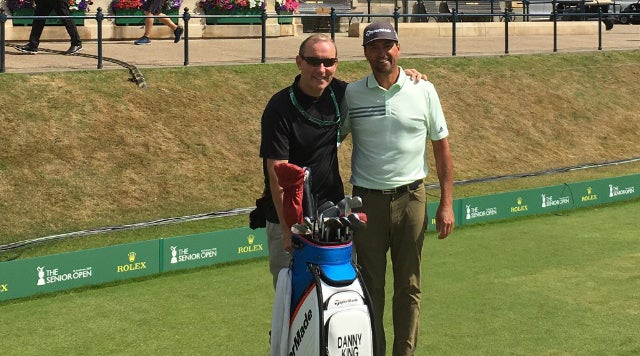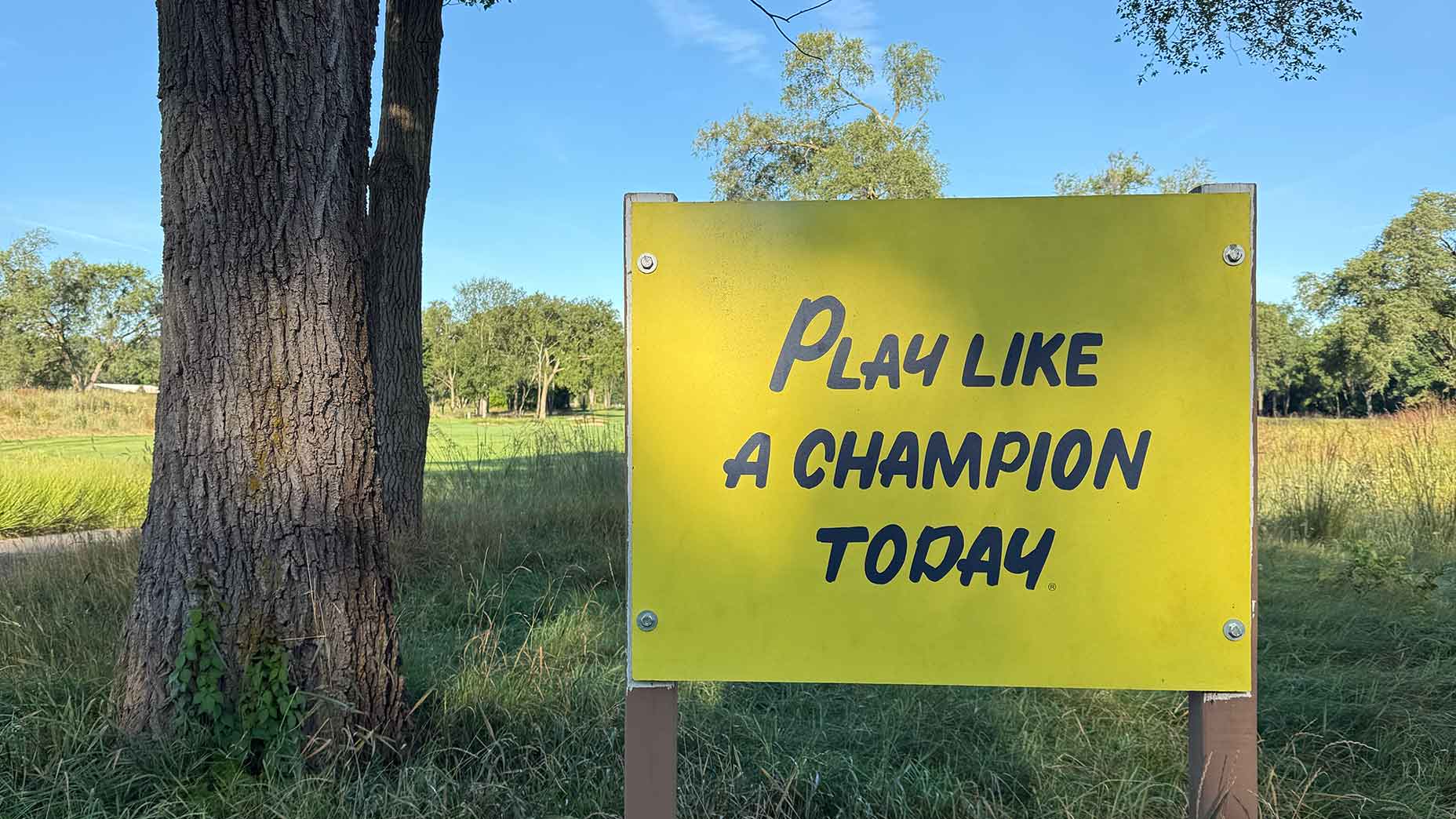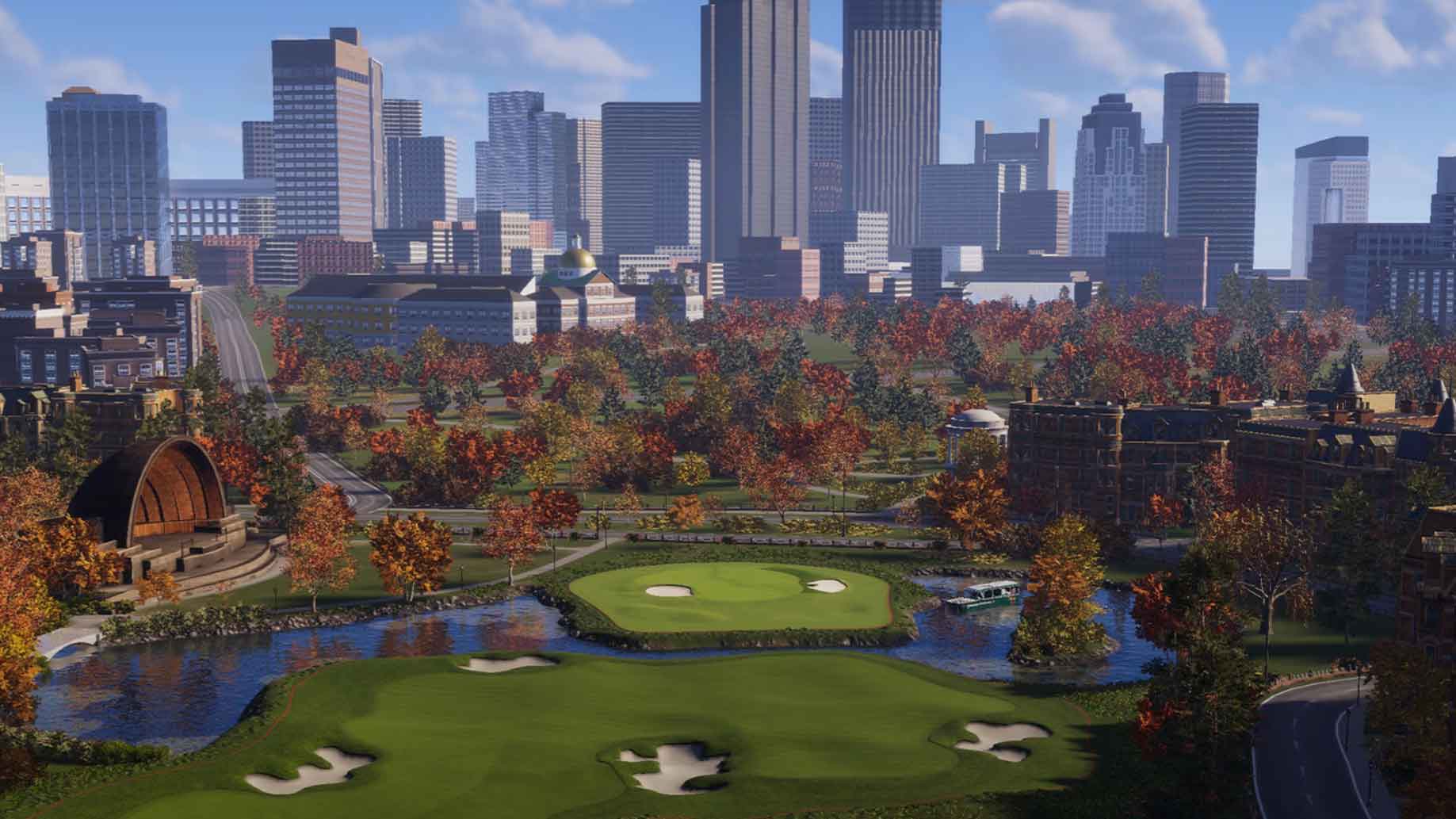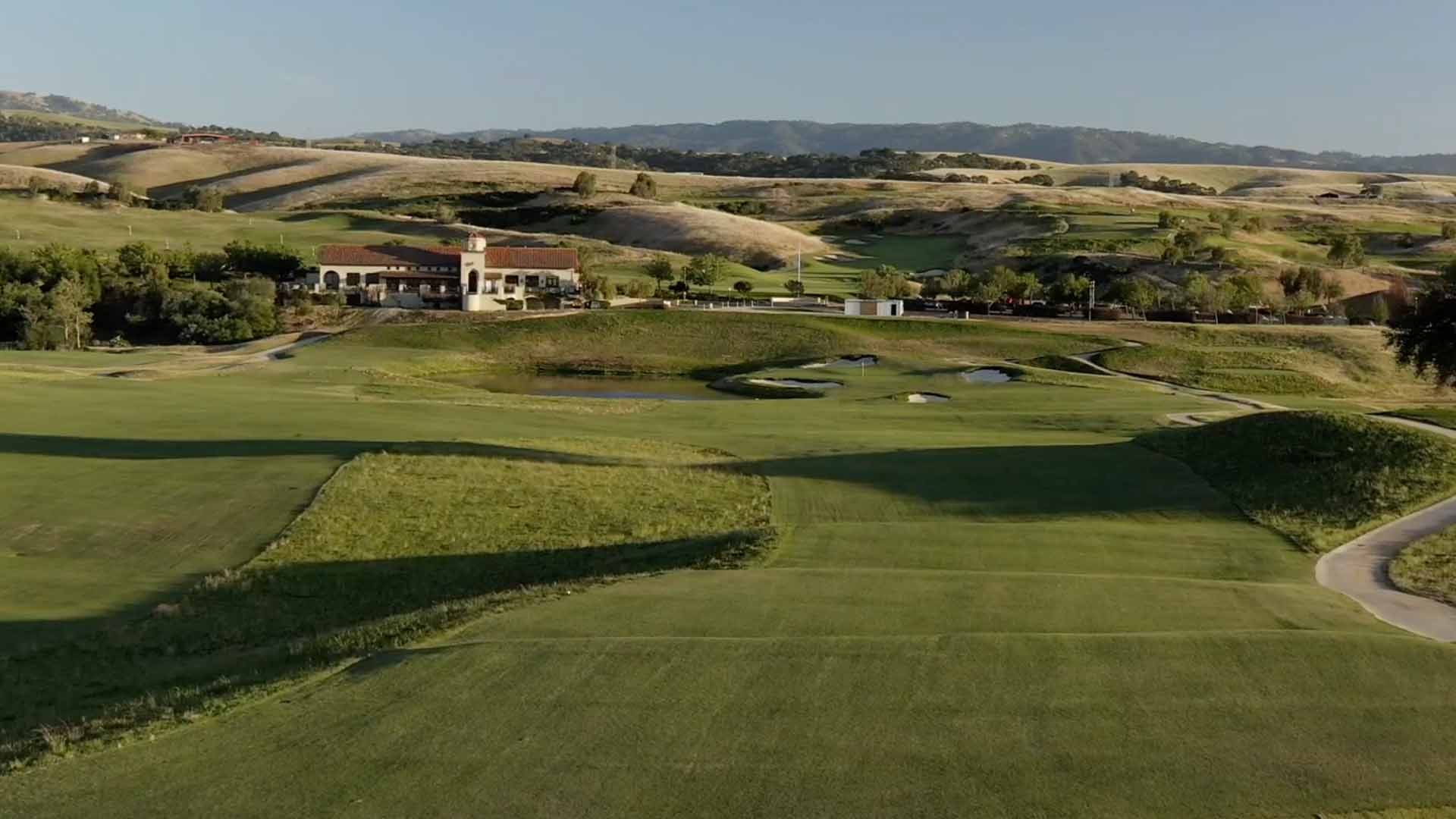Friday, July 20 was another warm and breezy day in the seemingly endless Scottish summer of 2018. In a convenient gap between working on books, I’d been lucky enough to be able to spend a good few weeks doing not much but playing golf — and in doing so completely rediscovering my mojo for playing the game at a respectable level.
That March I’d joined Scotscraig Golf Club — a wickedly attractive mix of links and heathland located a few miles north of St. Andrews. As well as being the world’s 13th oldest golf club, Scotscraig is one of a handful of local courses normally called upon to host qualifying for St. Andrews Opens and, this year, a St. Andrews Senior Open. On all levels, it’s a gem, and I’d comfortably recouped my membership fee within a few weeks of playing there every other day.
That Friday I was hanging around the 1st tee when the club pro came out of the shop, slightly panicked, with a favor to ask.
“Would you mind playing with this guy? Show him around a bit.”
“Sure,” I said, “Who is he?”
“His name’s Danny King. He’s from Toronto — here to try and qualify next week. Nice guy.”
I should say that I’m willing to play golf with pretty much anybody. But the idea of knocking it around with a pro was especially appealing — particularly when Danny appeared, carrying a lightweight travel bag and an honest smile. First thing I thought was: There’s no way on earth that this guy is 50…
Tall, athletic, young-featured, no trace of gray hair: Danny King would have breezed onto pretty much any college golf team without so much as a glance at his birth certificate. Ironically, as we got talking on the 1st fairway, it turned out that Danny hadn’t exactly breezed onto his own college golf team, decades ago at New Mexico State.
“I was just a walk-on,” he said, “… and not a very good one.”
“Really?” I asked, replaying in my mind the near-perfect swing and ball-striking he had already displayed.
“Yeah, I really wasn’t a good amateur. I had as much passion as you could ask for, just not the skills.”
“So what happened?” I asked.
“I got the skills…”
Danny explained that, while his job as director of instruction at the Performance Academy at the Magna Golf Club near Toronto was fulfilling enough, what he really wanted to be doing every week was mix it with the best of the PGA Tour Champions. And he had reason enough to feel that way. As well as a resume that included, among many titles, five PGA of Canada wins, he’d also been encouragingly close to fulfilling his dreams at Champions tour qualifying school on a couple of occasions.
“It’s tough, though,” he said, cleaning the grooves of a gap wedge with his thumbnail. “And I got very close.”
“How close?” I asked.
Danny paused and stared me down.
“Mark, you’ve got to understand that it’s golf in a bubble. There’s no air. It’s not about ball-striking; everyone can play. On courses like we play on, it all comes down to putting. And I’ve always come up just a little short.” Champions tour Q-School final stage has until recently taken place in Scottsdale, Ariz., each November.
“But you seem like you’re a good putter,” I offered.
“Not good enough.”
As our round progressed, Danny and I settled into a comfortable, friendly vibe. We riffed about family life, kids, golf, his decision to pack the bags and jet to Scotland to stay in a comfortable but small room in St. Andrews town center where he was woken daily at 3:30 a.m. by the pigeons and then again at 5:30 a.m. by the seagulls — all in a quest to try to qualify. He told me what seeing his name on the starting tee-time time list for the following Thursday’s competition would mean to him.
“I just want to be there on the Old Course. I really feel like now, having recently turned 50, I belong here.”
I couldn’t argue.

There was an authority that came with Danny’s swing and demeanor that you couldn’t ignore. You knew he’d won tournaments and would win more. He was long, very long, but also possessed the kind of feel and hands that only artists have. I just sat back, enjoyed the show — and did what I’d been asked to do: Show him the course. My golf, if you could even call it that in such elevated company, had become a mere sideshow.
However, as a recovering ex-caddie of almost 15 years, something was stirring in me. Honestly, at no point in the preceding decade and a half had I even considered caddying again. As far as I was concerned, my time on the bag had come at a very specific period in my life and for several identifiable reasons — almost all of which I genuinely believed no longer applied. In my eyes, I was in a different place.
But until that moment on the 13th tee at Scotscraig on that Saturday afternoon, I hadn’t bargained on one thing: Once you’ve caddied for a living and lived that unique life, a part of it never, ever leaves you. No matter what you do, no matter how far that is from a golf course, the desire lives on and will emerge under the right conditions. I realized that Danny was the embodiment of those conditions.
“I’ve got a suggestion,” I said as we waited for the green to clear. “On Monday in qualifying, why don’t I carry the bag for you? Let’s see if we can get something going.”
“Are you serious? You’d actually consider doing that?”
“Absolutely, I would, boss. You want me, I’ll be there.”
“That would be awesome. Thank you so much. I can’t believe you’d do this.”
“By the way,” I added by way of reassurance, “I’ve done some of this before.”
With that, we shook hands. It seemed entirely natural to do so. And as we parted company at the end of the round we had a quick drink, an exchange of phone numbers and a “Let’s touch base on Sunday afternoon.”
———-
Over the remainder of that weekend, I thought long and hard about what I’d hastily agreed to do. Initially, one part of me felt that I was making a very regressive step. Maybe I was just grabbing at something that was there and that was familiar, as a means of self-validation. Then I realized that I didn’t need affirmation. I’d become a much happier person since I’d last caddied and I was finally doing something with my life that made me feel good day-to-day, as well as giving me a means to pay the bills and some extra. So that wasn’t it.
On reflection, the reason I’d agreed, on a whim, out of nowhere, to caddie again, was twofold. One, I simply couldn’t deny that I really enjoyed the process of pacing off yardages, gauging wind directions, reading the occasional putt and offering lines off tees. Being on the job. I love golf — and a pro of Danny’s ability was far more deserving of my efforts than my own golf game ever was. Secondly, there was a personal connection that was undeniable, to both of us. Here was a guy who’d traveled a long way with a dream. He clearly had the tools, and in me it seemed that not only had a he found a like-minded friend, but that he’d also hit upon that one extra bit of help that could push him over the line. The synergy seemed obvious to us both.
For the first few holes of qualifying the following Monday, in a group with seasoned tour pro Willie Wood and an amateur from the Manchester area that started its round on the 10th tee, that synergy was evident where it mattered most: on Danny’s scorecard.
Solid three-iron after solid three-iron (dude carries it 240!) found Scotscraig’s baked out and undulating fairways. Five footers, on the odd occasion where he needed to grind a little, never looked like they’d miss. The good times rolled until, when we reached the 18th green (our 9th), Danny drilled a 10-footer into subterranean darkness to put himself among the lowest scorers on the day.
“King, four under…” he said to the scoring assistant as we walked to the 1st tee. I didn’t even look at the scoreboard outside the clubhouse. I didn’t need to. I knew my man would either be leading or very close to it. The job was only half done.
Then something changed.
Looking back now, I compare what happened to an engine running low on oil. Movements became less fluid, the results less efficient. A bogey at number one followed as Danny failed to convert what would have been an in-his-sleep up and down half an hour previously.
Three under.
Another dropped shot followed after a sloppy bunker shot at the par-3 3rd hole.
Two under.
An almost lost ball at the 5th led to yet another bogey.
One under.
Suddenly, although nothing was said at the time, it felt as if we were playing aggressive defense. Every swing became an effort; every putt seemed longer. It felt like the course was strangling Danny. Meanwhile, I gripped the bag tighter and held my breath a little longer each time he drew the club back, willing there to be some relief for us both. I thought to myself for the first time: Why am I doing this?
At the par-3 6th hole we almost got some relief. Danny’s 9-iron was as perfect as it could have been for a danger pin tucked back right. He had 25 feet across the green to get back to two under. The putt rolled, almost in slow motion, as I watched through parted fingers from behind the bag at the back of the green. Five feet out it looked dead center, and perfect pace. Danny was walking it down now, putter rising slowly as if to acknowledge a sound that seemed certain. But no sound came. The ball reached the hole, and then horseshoed and stayed out, all at dead-weight pace. He stared at the ball; it stared back.
“S—, I’ve never seen a putt do that in my life at that speed,” he said as we walked to the tee.
“Nope, me neither,” I said, “…but it did it, so let’s forget it.”
Despite my attempts at positivity, the next two holes were a blur of tension. A massive break off the 7th tee gave him a decent lie in the rough.
Grinded par. A hooked three-wood into a fairway bunker on 8 meant a sideways hack out that left a wedge to a pin cut alarmingly close to the front of a two-tiered green.
I was thinking, but not saying: Get up and down here and birdie the short par-5 9th and this guy is in.
Whether he heard me or not, Danny stepped up and hit surely one of the shots of his life: a delicate 90-yard shot with cut spin onto what was essentially upturned, polished concrete. The putt for par was never missing.
I handed him the driver on the 9th tee and said, “Just hit this down on the line of the flagpoles you see there.”
“I can do that.”
But he didn’t.
The ball sailed high and right toward the adjoining 10th fairway, on line for a small copse of fir trees between the two.
“I think you might be OK, Danny,” our amateur partner said.
“I didn’t see it land. “ I said, cautiously. “But let’s see what we find.”
What we found wasn’t great — particularly on what was a reachable par 5. The ball was lying OK in theory, but the route to green was blocked by trees and the backswing similarly so.
“What’s the plan here?” I asked, hoping he’d talk about something like a wedge 20 yards down the fairway.
“I’m hitting there,” he said, pointing to a spot 20 yards away. “With a wedge.”
Alright, we’re still in this, I thought.
A sweet six iron from 198 left 20 feet down the green for birdie and, in my mind, certain qualification at one-under 70. Danny stalked the putt more than was normal for him — aim-pointing it to two degrees from left to right. Then it rolled.
Good pace. But it crept on, finally stopping two and a half feet past the cup. Ballgame right here, I thought, as Danny settled over the comebacker. All the time I have a number imprinted in my head and it wasn’t 71 — the exact number Danny’s scorecard amounted to after the par putt hung agonizingly on the right lip. Willie Wood looked at me; I looked back. The amateur partner looked at me; I looked back. We all knew what this probably meant. I shook Danny’s hand on the green and in his kind eyes I knew that he knew too what we all knew: He was probably going to miss playing in the Senior Open on the Old Course by one shot.
——–
What followed was nothing short of purgatorial, as the scoreboard was updated regularly, with anguished faces staring on, until seven red numbers that were lower than 71 were displayed.
“I’m out, right?” Danny asked me.
“It’s looking that way,” I said. There was no way to soften the blow. “But they’re talking about the 71s playing off for the 3rd and 7th alternate spots.”
As we spoke, the genial veteran pro Dick Mast appeared, brandishing a driver as if his day’s work was incomplete.
“You a 71 too, Danny?”
“Yeah.”
“There are nine of us. Playoff for two spots.”
“What are the spots worth?” Danny asked.
“Third alternate, you’ve got a chance. You’ll get to practice; you’ll have some privileges. Seventh, you’ve got no chance. You’ve got guys who’ll get new limbs and have open heart surgery, just to play in this.”
Danny and I looked at each other.
“So, it looks like I’ll be able to touch it but not actually taste it? “ he said.
“Let’s win this playoff and see what happens.”
In fading light, with the first rain clouds in three months looming in the Fife sky, nine 71s gathered on the 10th tee of Scotscraig while the R&A official in attendance assigned and then drew lots to establish numbers one to nine, who would playoff, sudden-death, in a fivesome followed by a four-ball. Among them were Mast, the mercurial Paraguayan Carlos Franco and, of course, Danny.
As we walked up the fairway to Danny’s ball, the rain was horizontal.
“There’s one birdie up there,” the official told us, referring to the group of five ahead at the green.
“Let’s add another one, boss, ” I said to Danny as he settled over his wedge from 137.
He knocked it to eight feet and drained the putt to match Franco’s. We walked to the 18th tee as the rain became even more horizontal.
“Time to man up, I guess,” Danny said. “We’re in f—in’ Scotland after all.”
Sure enough, Danny beat Franco in the playoff to gain the third alternate spot.
As we walked to our cars that evening, soaking wet, both Danny and I knew he was about to enter a half-life that would more than likely lead to disappointment. The question was: Would I be going there with him? I had plans for the week, yes. But then I asked myself whether they were plans so exciting that they weren’t worth cancelling to keep this journey alive. The answer came easily as Danny loaded his clubs into his rental car.
“I don’t think I’m ready for this to be over quite yet,” I told him. “If you want me there to practice tomorrow, what the hell — count me in.”
“You have to be kidding me? You want to do that?”
“Absolutely, I do.”
“Give me a hug, man. I feel like this has all happened for a reason. Let’s see where it goes.”
And with that, in the pouring rain in a temporary car park in Tayport, Danny and I stood, two grown men, and hugged.
I walked to my car.
“See you at the range at 10,” I shouted over my shoulder.
“I love you much, see you there!” he said.
That we played two wonderful practice rounds on the Old Course in beautiful weather with some legends of the game is almost an afterthought. That I breezed past the caddie shack and into the hallowed confines of the range without so much as a thought for my past caddying experiences is similarly so. I realized that yes, I was here — but also that the crazy unpredictability life had allowed me, via Danny, to approach the world of pro caddying from a completely different trajectory. The places were the same — the Titleist truck, the caddie lounge — and the people — the security guards and the fellow, grizzled caddies — were generally the same too. But crucially, the feelings that came with it all for me weren’t. Not at all.
As such, this was simultaneously a caddying rebirth and exorcism, all in one. I’ve got Danny to thank for that and I’ll never forget the few days we spent in each other’s company. As we communicated by text as he left town knowing that third alternate wasn’t, indeed, getting in, we both seemed to understand what the week meant.
“I’ve had so many people come to me and compliment you since you left, Danny,” I texted. “You belong out there, and you will get there. I know you will.”
“You’re right,” he wrote back. “I’m disappointed about what happened, but meeting you made the pain of it all so much easier to take.”





